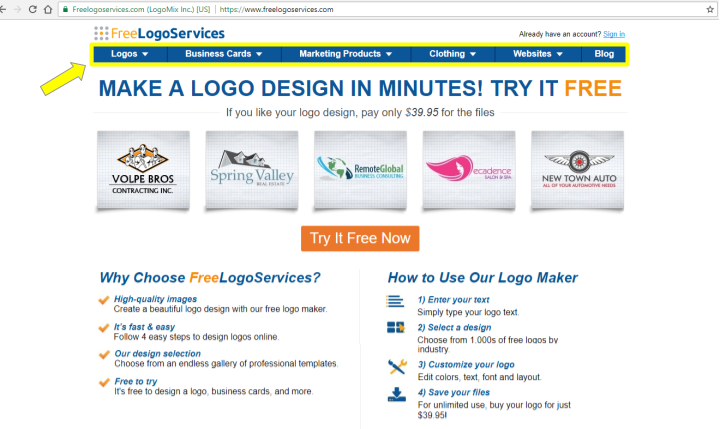When you’re ready to create a website for your business, it can be confusing to untangle all the Internet jargon. Most likely, you have a lot of questions about where to begin. What are web servers and URLs? What is the difference between a website and a domain? How and where does a website “live” online?
Basic website setup is so simple that you could have a new site up and running in hours. You only need three things to get started:
- A domain name for your website
- A platform to build and manage your website
- A place to host your website
Let’s take a look at key terms to understand how a website works.
What is a website?

A website is a group of related pages that are linked together through a domain name. A typical website has a homepage with a navigation bar listing other web pages. Each page can serve a different purpose and have unique text or media.
In order to show up correctly in a web browser, websites have to follow standard coding and structural guidelines. However, many popular website builders such as Squarespace or FreeLogoServices are geared to beginners. You can customize your site without any design skills, and the platform automatically generates the code.
What is a domain name?

A domain name is an address that identifies your website’s unique location online. Think of a domain name as the directions to your site. When people type the name into an address bar, the browser can find out where your site is hosted. A domain name consists of the words that come after “www.” A site with multiple pages has a subdomain for every page. For example:
-
- Main site domain: workoutwithme.com
- Subdomain for blog: workoutwithme.com/blog
- Subdomain for individual blog post: workoutwithme.com/blog/2017/5/15/reasons-to-work-out-with-friends
Keep one thing in mind — a registered domain name can exist without a website. In fact, speculators buy up thousands of unused domain names in hopes of selling them at a higher price. A site isn’t live until the domain name points to the website and host. It’s also possible to have multiple domains directing to the same site.
You can get creative and choose any domain name you want, as long as it isn’t already taken. Find a domain by looking up available names from a domain registrar, such as GoDaddy or Namecheap.
> Helpful tip: Try our domain name search tool to research available names.
You must pay an annual fee to own a domain and renew your registration.
If your domain expires and someone else purchases it, you can make an offer to try and regain ownership. However, most sellers will charge much more than your renewal fee, since the domain is in demand.
What is a URL?

Remember how a website can have more than one page under the same domain? Every page needs an exact address to identify its location on the site as a whole. This is true even when a site is a single page. A Universal Resource Locator (URL), is the complete address for each web page.
What’s a web host?
Websites look simple on the surface, but they’re basically made up of data and file directories. A web host stores and processes all of these files on computers known as web servers.
Many website building platforms sell domains and web hosting, making it easy for beginners to quickly create a site. Otherwise, you can find your own web hosting provider, which is known as self-hosting.
WordPress.com and WordPress.org are perfect examples. WordPress.com is a blogging platform that provides website templates and hosting. WordPress.org is site development software that you can download for free. But you have to pay for a separate host to get your finished website online. Some well-known web hosting platforms include:
-
-
- Bluehost
- HostGator
- GoDaddy
- InMotion Hosting
-
Choosing the right host affects your website cost, speed, and security. A host has to be reliable with backup servers and few site outages. You don’t want a business site to be out of service at unpredictable times, driving away customers.
Another thing to consider is shared versus dedicated hosting. With shared hosting, the provider hosts multiple sites on the same server. As a result, each site has limited bandwidth, and the owner is charged for exceeding the limit. Dedicated hosting means your site is the only one on the server. Dedicated servers are better for large sites with a high volume of traffic.
Many web hosts offer a monthly or yearly subscription, with a discounted percentage for the latter option. Some only offer annual options, which may be difficult to pay upfront with a tight budget.
Publishing your finished site
Now that you have the basics under your belt, let’s discuss how a website goes live online. Whenever you surf the Internet, web browsers send file requests between special servers, known as Domain Name Systems (DNS).
While it’s easier for humans to read words, computers communicate with numbers. DNS servers translate domains into numerical identifiers, or IP addresses. This complex exchange helps a server validate a site and URL, and it takes place in seconds.
DNS servers have unique IP addresses. That’s why it’s important to point your domain name to the correct DNS servers to publish your site. Simply put, it’s a way of telling other servers where your site lives online. You can use the same domain name even if you move to a different web hosting platform.
Your web host platform may take care of this final step when the provider also hosts your domain name. If you’re working with two separate providers, your website host will tell you which IP addresses to target.
Scaling your site for your needs
The best thing about creating a website is the endless room for improvement. Getting a clean, functional site up online is essential to building your brand. At the same time, you should always look for new ways to improve the user experience as your business grows. The Internet is a flexible place, so you never have to stick with whatever site you started with.
Need help getting your business website up and running? Take a look at our custom website packages. We’ll do the work for you!



